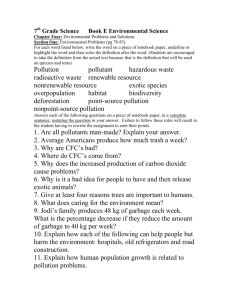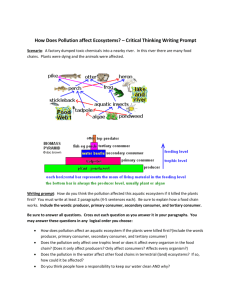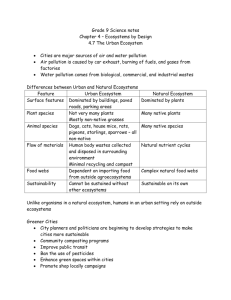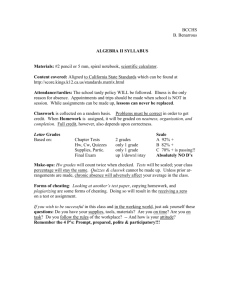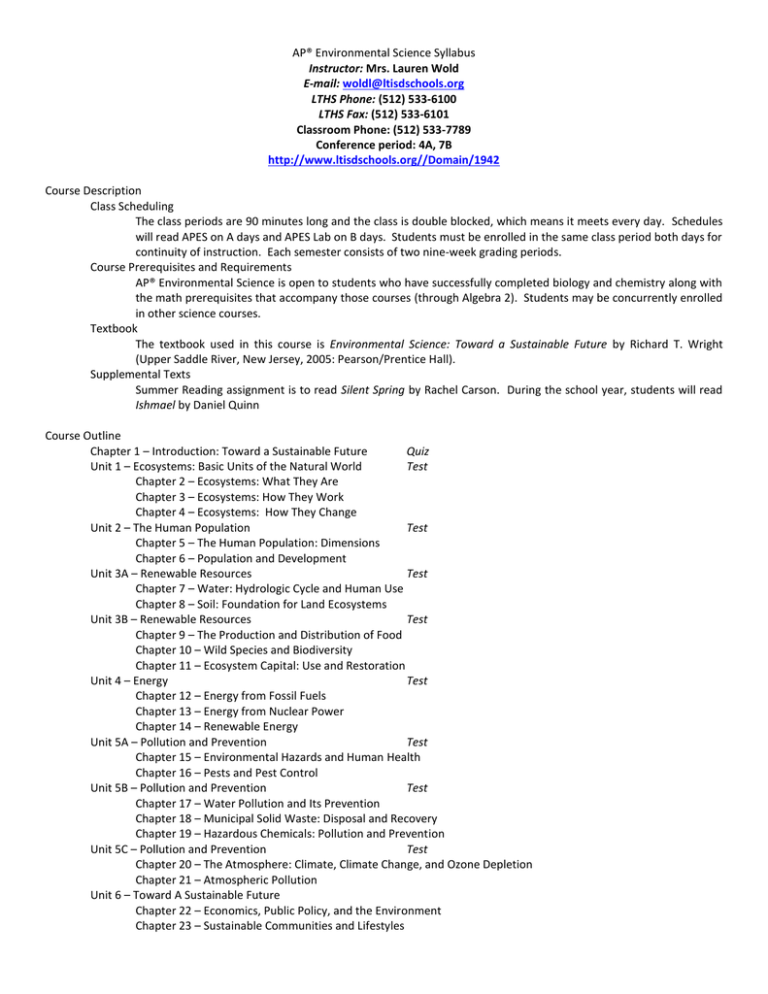
AP® Environmental Science Syllabus
Instructor: Mrs. Lauren Wold
E-mail: woldl@ltisdschools.org
LTHS Phone: (512) 533-6100
LTHS Fax: (512) 533-6101
Classroom Phone: (512) 533-7789
Conference period: 4A, 7B
http://www.ltisdschools.org//Domain/1942
Course Description
Class Scheduling
The class periods are 90 minutes long and the class is double blocked, which means it meets every day. Schedules
will read APES on A days and APES Lab on B days. Students must be enrolled in the same class period both days for
continuity of instruction. Each semester consists of two nine-week grading periods.
Course Prerequisites and Requirements
AP® Environmental Science is open to students who have successfully completed biology and chemistry along with
the math prerequisites that accompany those courses (through Algebra 2). Students may be concurrently enrolled
in other science courses.
Textbook
The textbook used in this course is Environmental Science: Toward a Sustainable Future by Richard T. Wright
(Upper Saddle River, New Jersey, 2005: Pearson/Prentice Hall).
Supplemental Texts
Summer Reading assignment is to read Silent Spring by Rachel Carson. During the school year, students will read
Ishmael by Daniel Quinn
Course Outline
Chapter 1 – Introduction: Toward a Sustainable Future
Quiz
Unit 1 – Ecosystems: Basic Units of the Natural World
Test
Chapter 2 – Ecosystems: What They Are
Chapter 3 – Ecosystems: How They Work
Chapter 4 – Ecosystems: How They Change
Unit 2 – The Human Population
Test
Chapter 5 – The Human Population: Dimensions
Chapter 6 – Population and Development
Unit 3A – Renewable Resources
Test
Chapter 7 – Water: Hydrologic Cycle and Human Use
Chapter 8 – Soil: Foundation for Land Ecosystems
Unit 3B – Renewable Resources
Test
Chapter 9 – The Production and Distribution of Food
Chapter 10 – Wild Species and Biodiversity
Chapter 11 – Ecosystem Capital: Use and Restoration
Unit 4 – Energy
Test
Chapter 12 – Energy from Fossil Fuels
Chapter 13 – Energy from Nuclear Power
Chapter 14 – Renewable Energy
Unit 5A – Pollution and Prevention
Test
Chapter 15 – Environmental Hazards and Human Health
Chapter 16 – Pests and Pest Control
Unit 5B – Pollution and Prevention
Test
Chapter 17 – Water Pollution and Its Prevention
Chapter 18 – Municipal Solid Waste: Disposal and Recovery
Chapter 19 – Hazardous Chemicals: Pollution and Prevention
Unit 5C – Pollution and Prevention
Test
Chapter 20 – The Atmosphere: Climate, Climate Change, and Ozone Depletion
Chapter 21 – Atmospheric Pollution
Unit 6 – Toward A Sustainable Future
Chapter 22 – Economics, Public Policy, and the Environment
Chapter 23 – Sustainable Communities and Lifestyles
Laboratory and Field Work
Independent Year-Long Project
Students are required to develop and implement a project that impacts the environment and community. At least
thirty hours of out-of-class effort is required for this project, ten of which must be verified by a supervising adult by
midterms. As final exams are administered after the AP® Exam, this project will count as the final exam grade in
the course. All students must complete the project and may not exempt the project. Final exam exemptions may
be used for attendance purposes only.
Class Projects
Throughout the year, there will be several class projects to raise environmental awareness around the school. The
class will run the school’s recycling program and will develop other initiatives for Recycling Day and Earth Day. The
nature of the projects will be determined by the students in the course and must be approved by the instructor.
Field Trips
Fall Field Trip
The APES classes will take a one-day in-town class field trip in the fall to a local protected land site and a
conservation area. The cost will be minimal. All students must have a field notebook, pen and have
signed a field safety agreement in order to attend.
Spring Field Trip
The APES classes will take a three-day/two-night out-of-town field trip to a coastal research facility in the
spring. The cost for this trip will range from $150-200 per student, but cost can be offset by fundraising.
All classroom, lab, field, and school rules apply on this trip.
Laboratory Experiences
Resources for Laboratory Experiences:
Carolina Biological Supply: Advanced Placement Environmental Science Resource Manual.
Molnar, William. Laboratory Investigations: AP® Environmental Science. Peoples Publishing, 2005.
Grading Policy
Nine-weeks grading period average for all classes of AP Environmental Science is based upon...
70% Major Grades, including at least 3 recorded grades in this category per nine-weeks.
Major assessments consist of short answer, matching, problem-solving, completion, labeling, multiple choice, and essays.
Major projects/papers and major laboratory assignments may also be included. Rubrics for major projects and major papers
will be given in class and published on the teacher's web page.
Subcategories:
50% Tests and Projects
20 % Labs and Quizzes (All students are required to keep a lab notebook)
30% Daily Grades, including at least 10 recorded grades in this category per nine weeks.
Daily grades may include textbook assignments, worksheets, vocabulary exercises, class activities, notebook checks, article
summaries, small projects, etc. All teachers of the same course title will have the same number of daily grades will be
based upon completion/participation.
Students will not be given an opportunity to makeup or redo a failing daily or major assignment. Due to the rigorous nature of
advanced classes, late work is not accepted and retesting is not offered in AP Science classes.
Missing work due to absence: Students have a period of time equal to the length of the absence to turn in makeup work for full
credit, according to student handbook policy.
Classroom Policies
AP Environmental Science
A. Note from the Instructor
I will lead a respectful and disciplined, yet comfortable and enjoyable classroom. To achieve this I have
established a few simple policies. As a student, it is your responsibility to comply with these policies. If you
decide not to comply, there will be logical consequences. By enforcing these policies, I promise to you fairness
and order in our classroom.
B. Class Rules
Please Watch Your Mouth- Students will exhibit courtesy and respect toward all other students at all times.
Hateful comments concerning race, gender, sexual orientation, political views, appearance, or of any other
type will not be tolerated; this applies to serious as well as joking comments.
Please Keep Your Hands to Yourself- Physical contact of any kind is not permitted. Our classroom is our lab, so
all lab safety rules must be followed at all times.
Please Stay in Your Seat- Do not walk around during class unless directed to do so. Have everything you need
ready before class begins.
Take Care of Your Business Before the Bell Rings- The 90 minutes that you are scheduled to be in
Environmental Science are for you to be learning science. Take care of all trips to the office, bathroom, locker,
etc. before or after class.
Please Do Not Bring Food In the Classroom- Students may not eat or drink in the classroom. Closable
containers of water are permitted. Food will be permitted only in controlled locations…..remember our lab is
our classroom. You do NOT want to contaminate your food with lab supplies!
I Need to See Your Eyes- Students may not sleep in class. To prevent this, students' eyes must be open and
visible to the instructor at all times. This includes keeping eyes from looking into laps and texting under the
table. Please keep your head off of the table during instruction and work time.
You Need to Be Able to Hear Me – No ipods, headphones, mp3 players, etc may be used during instruction. If
the entire class can agree on a music selection, we will play music quietly during work time.
Please Be Respectful of Classroom Equipment and Specimens- Disrespect is not only rude, it is usually
wasteful, which is a direct violation of the principles of this course. Practice sustainability in all that you do.
C. If YOU CHOOSE to Break a Rule:
Consequences will always fit the offense. There are behaviors that will warrant an Office Referral immediately,
others can be managed in the classroom. Examples of behaviors worthy of a referral include gross
insubordination or violent behavior. Behaviors that are less severe, but in violation of the basic rules of the
class will be dealt with in an appropriate and individual manner.
D. Tardiness and Late Arrivals
A student who is not in the classroom when the bell sounds, is considered either late or tardy. A student is
tardy if he or she is without a pass after the bell. A student is late if he or she arrives with a pass after the
bell. Tardy and Late students are not to disrupt the class. Late students need to hand their pass to the teacher.
There is no penalty for arriving late with a pass. Tardies will be handled by the Assistant Principal's office as
indicated in the student handbook
E. Academic Honesty
It is expected that students will use genuine, sincere, and fair means for the accomplishment of the tests,
tasks, or projects from which evaluations of progress shall be determined. Students found plagiarizing, copying
or cheating in any way will receive automatic zeros and an honor code violation. Honor Code Violations will be
handled by the Assistant Principal's office as indicated in the student handbook
F. Attendance
If a student has an excused absence from class he or she is responsible for the assignments/ homework that
missed. The student has as many days as he or she was absent to make up the assignments. It is up to the
student to inquire about missed work and tests. Zeros will be given if a student fails to make up work within an
acceptable time frame.
G. Late Work
Assignments, papers, and projects may not be turned in late.
H. Make-Up Tests
If a student has an excused absence for a test day, he/she may make up the test in the morning or afternoon.
Arranging a make-up requires signing up with the instructor. A missed make-up appointment without notice
will result in a zero.
AP Environmental Science and Environmental Studies Student Supply List
Room H217
LTHS Phone: 533-6100 • LTHS Fax: 533-6101
(Email: woldl@ltisdschools.org )
STUDENT SUPPLY LIST:
Composition Lab Notebook
2” Binder (minimum)
Dividers With Tabs For:
-Handouts
-Study Guides
-Notes
-Misc
Pens and Pencils
Colored Pencils/Markers
Ruler
Scissors
Notebook Paper
Highlighters
Black Fine Tip Permanent Marker
Box of Kleenex (to be left in the classroom)
Box of Gloves (to be left in the classroom)
Additional Lab Supplies (NOT REQUIRED, BUT GREATLY APPRECIATED):
Straws
Zip-loc bags (quart and gallon size)
Toothpicks
Dry Erase Markers
Glad Press-N-Seal



